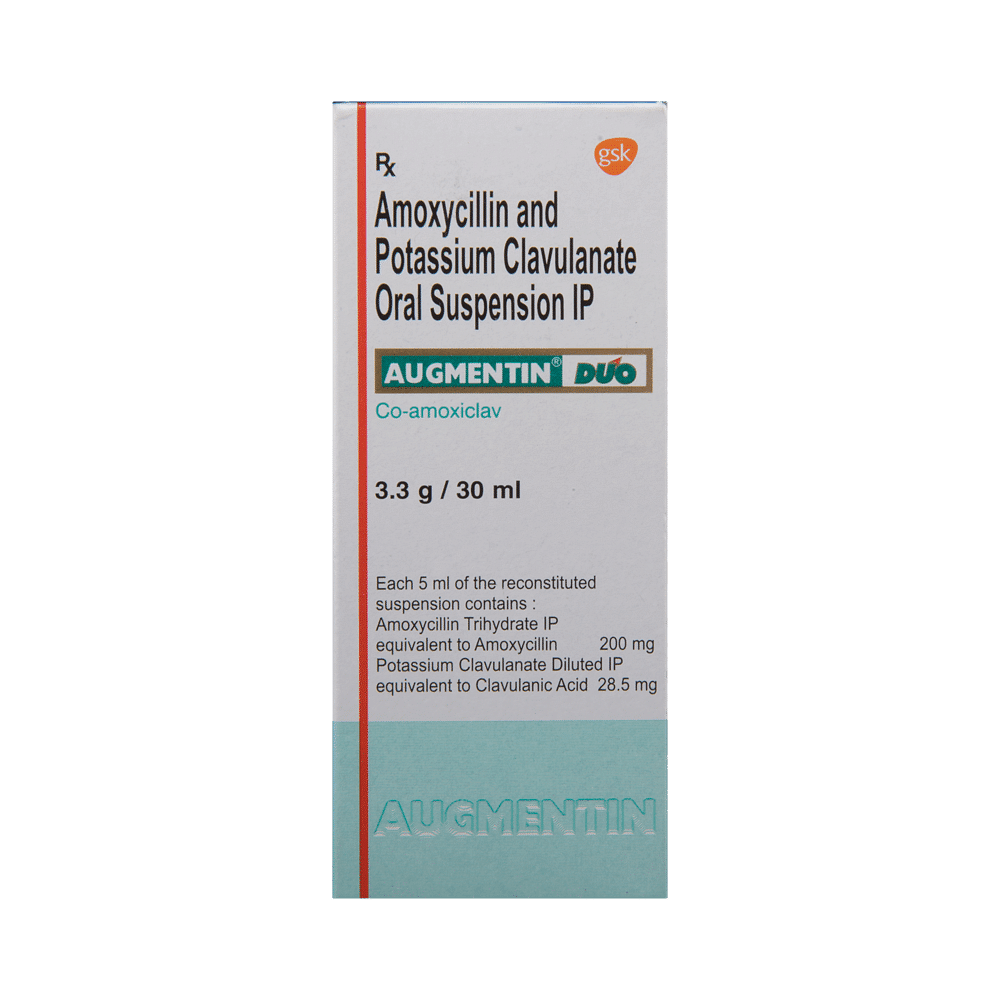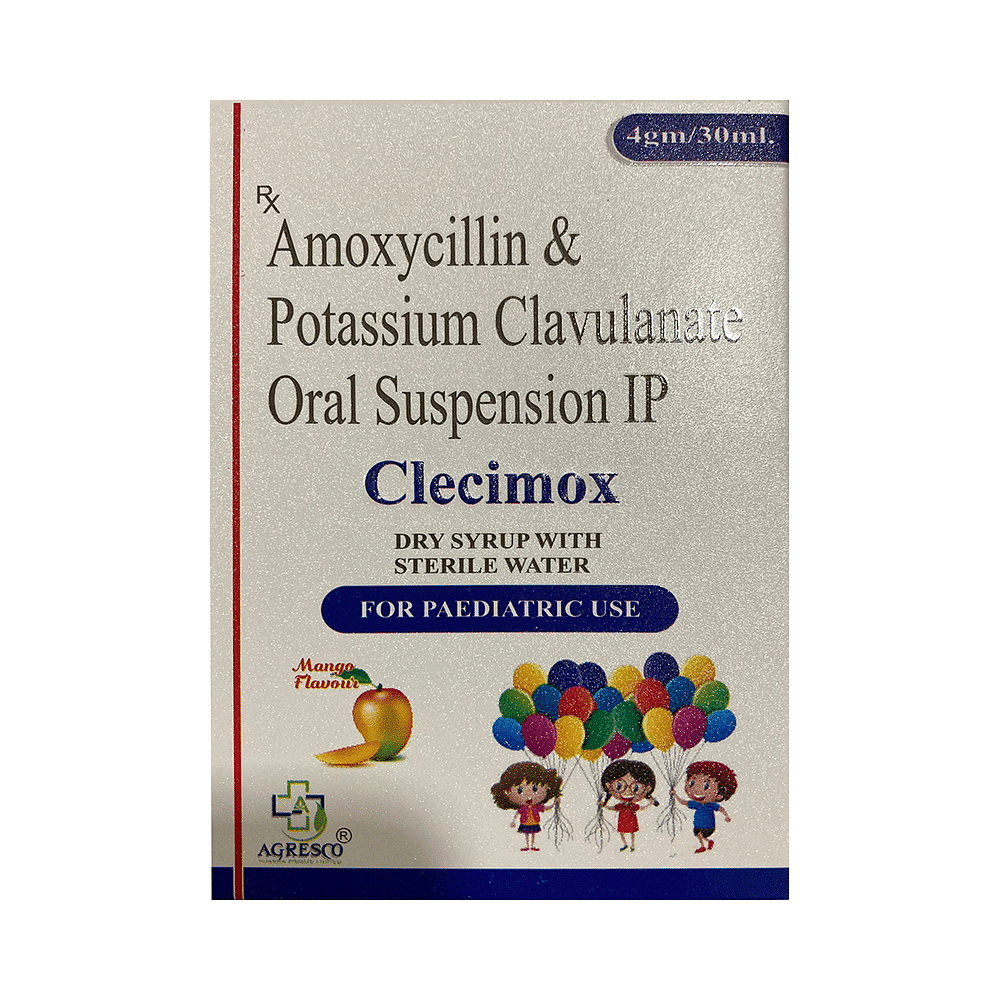
Amoxylla Dry Syrup
Manufacturer
Skylla Pharmaceuticals
Salt Composition
Amoxycillin (200mg) + Clavulanic Acid (28.5mg)
Key Information
Short Description
Amoxylla Dry Syrup is an antibiotic medicine that helps treat bacterial infections of the ear, nose, throat, chest, lungs, teeth, skin, and urinary tract.
Dosage Form
Oral Suspension
Introduction
Amoxylla Dry Syrup is an antibiotic medicine that helps treat bacterial infections of the ear, nose, throat, chest, lungs, teeth, skin, and urinary tract. It is capable of killing bacteria that have become resistant to other therapies and thus also helps treat tuberculosis that is resistant to other treatments.
Directions for Use
Your child must complete the entire course of antibiotics. Stopping too soon may cause the bacteria to multiply again or cause another infection.
Safety Information
Side Effects
Bitter taste in the mouth after intake Diarrhea Itchy rash, facial swelling, or breathing difficulty (stop medication and report to the doctor immediately)
How it works
Amoxylla Dry Syrup is an antibiotic. It has two active agents amoxycillin and clavulanic acid. Amoxycillin works by preventing the formation of the bacterial protective covering (cell wall) essential for the survival of the bacteria. Whereas clavulanic acid serves a special purpose of inhibiting an enzyme (beta-lactamase) that is produced by resistant bacteria.
Quick Tips
Complete the entire course of antibiotics Encourage your child to drink plenty of water in case diarrhea develops Never give Amoxylla Dry Syrup until and unless prescribed by the doctor Do not give Amoxylla Dry Syrup to treat common cold and flu-like symptoms caused by viruses Check 'expiry' before giving Amoxylla Dry Syrup to your child
Related Medicines

Augmentin Duo Suspension

Moxikind-CV Dry Syrup

Clecimox Dry Syrup Mango

Senclav Dry Syrup

Silimox-CV Dry Syrup

Alkav Dry Syrup

Elmox CV Dry Syrup

Surellin-CV Dry Syrup

Tymocil-CV Dry Syrup Strawberry

Easyclav DS Oral Suspension
Frequently asked questions
Can other medicines be taken at the same time as Amoxylla Dry Syrup?
Amoxylla Dry Syrup may interact with certain medications or substances. It is crucial to inform your child's doctor about all other medicines they are currently taking before starting Amoxylla Dry Syrup. Consulting your child's healthcare provider is also necessary before administering any medicine to your child.
Can I receive a vaccination while on treatment with Amoxylla Dry Syrup?
Antibiotics generally do not interfere with the ingredients in vaccines or cause adverse reactions in children who have recently received them. However, it is essential to avoid vaccination until your child recovers from the illness. Once your child feels better, the vaccine can be administered.
Which laboratory tests might I have to undergo while taking Amoxylla Dry Syrup long-term?
In cases of prolonged treatment, doctors may periodically monitor kidney and liver function tests to ensure your child's well-being.
Can I give a higher dose than the recommended dosage of Amoxylla Dry Syrup to my child?
Giving a higher dose of this medication than prescribed can increase the risk of side effects. If your child experiences worsening symptoms, please contact their doctor for further evaluation.
Can I stop giving Amoxylla Dry Syrup to my child when the symptoms improve?
No, do not stop administering this medication until the full course of treatment is completed, even if you believe your child feels better. Symptoms may improve before the infection is fully eradicated. Continue with the prescribed course for optimal results.
Can Amoxylla Dry Syrup cause diarrhea in my child?
Yes, Amoxylla Dry Syrup may trigger diarrhea. It acts as an antibiotic to fight harmful bacteria. Additionally, this medicine can disrupt the balance of helpful bacteria in your child's digestive system, leading to diarrhea. If your child experiences diarrhea, encourage them to consume plenty of fluids. If the diarrhea persists or you notice signs of dehydration such as reduced urination and dark, strong-smelling urine, consult your doctor before administering any other medication.
Do all viral common colds result in secondary bacterial infection?
Most cases of viral infections do not lead to secondary bacterial infections. In fact, giving antibiotics in a viral infection may increase the likelihood of side effects. Consult your child's doctor before administering antibiotics.
My child has yellow-green mucus coming out of their nose. Is it a sign of a bacterial infection?
Yellow or green mucus in the nose is not a strong indicator of a need for immediate antibiotic treatment. During a common cold, nasal mucus thickens and changes color from clear to yellow or green. Symptoms typically resolve within 7-10 days.
Are there any signs that my child requires immediate medical attention?
Seek immediate medical help if your child experiences serious allergic reactions (difficulty breathing, skin rash), gastrointestinal problems like diarrhea, or liver damage symptoms such as weakness, pallor, and vomiting. Although rare, these side effects require expert intervention.


